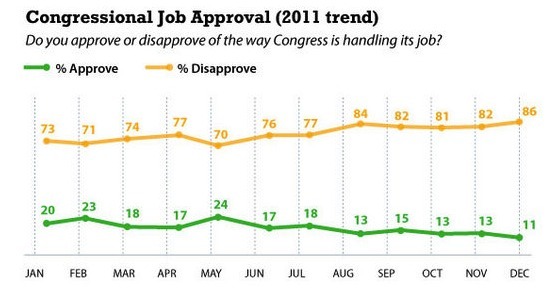-
by CityLightsLover
1 Recs
-
Little smaller but more determined crowd brought sleeping bags today.
The sit-in outside the office of Chicago Mayor Rahm Emanuel resumed shortly after 8:00 a.m. on January 5, 2012, following the ...
by Hyde Park Johnny
1 Recs
-
Turning into butterflies? Guess not.
So the goal is to reign more indiscriminate terror and death from the skies?
by EdMass
2 Recs
-
The spirit of Occupy Wall Street has entered the hallowed halls of The New York Times. Not because the paper is covering OWS, mind you. Rather, an uprising has arisen within the paper itself.
The ...
by The Troubadour
8 Recs
-
Video of Geekeasy being arrested. The police tell him to move beyond a fictional line and he keeps backing away asking them what line he needs to back ...
by Horace Boothroyd III
0 Recs
-
If you have noticed an uptick in email chain letters and Facebook posts about how welfare recipients are drug-fueled slackers, it is because the 1% wants to further harm the poor and outlaw abortions,
by Zwoof
2 Recs
-
Many a person has suffered the slings and arrows of our totaltarian government bodies. We have the undeniable murder by police of the homeless Kelly Thomas in Fullerton California (basic ...
by laserhaas
1 Recs
-
A trio of national polls exploring the GOP primary hit our eyes on Thursday. If you are rooting for Romney or ...
by Steve Singiser
7 Recs
-
Just a heads-up to anyone who is interested in my new, 2012 specialty blog (I have 6 now!) called ROMNEY THE LIAR . (Good name, huh? Short, descriptive, truthful. It's almost an ...
by Yosef 52
0 Recs
-
For those of us living on Social Security benefits only (whether through retirement or disability), 2010 and 2011 were bleak years. No COLAs (cost-of-living adjustments) whatsoever - even though ...
by GayIthacan
3 Recs
-
Tonight, we have two to remember. One was a sailor in the highly specialized area of Explosive Ordnance Disposal and the other a soldier and father to two children. Both died in Afghanistan.
...
by Sandy on Signal
23 Recs
-
This should come as a shock to exactly....nobody... The judge selected to hear Governor Walker's assertion the the GAB should discard obviously false names has ruled in the Governor's favor......
by Up North
11 Recs
-
No, that's not the official message this time around - this is from The Onion: Obama Openly ...
by xaxnar
4 Recs
-
It's because they are his kind of people, rich people, the right people. Did you ...
by LeftOfYou
4 Recs
-
Hello, writers. Write On! turns three years old this week. Originally I had meant to keep it going for a few months, till I ran out of things to say about writing. Well, I ran out of things to say ...
by SensibleShoes
15 Recs
-
Really pretty brutal opposition Santorum got from students ...
by Scott Wooledge
36 Recs
-
In recent months, we have talked a good amount about historical memory and how race is a ...
by chaunceydevega
9 Recs
-
Cross-posted at The Progressive Zionist
Two Ultra-Orthodox (Haredi) men ...
by Mets102
14 Recs
-
I've been getting plenty of physical exercise lately, so I'd like to do the mental equivalent and do some heavy lifting for the benefit of the community. So, I'm going to set aside my own reactions,
by Troubadour
13 Recs
-
Hello everyone,
Walk with me as I explain my January budget.
Confessions of a Retail Worker is a continuing series about the worklife of low-paid, non-managerial ...
by Lightbulb
28 Recs
-
When you have clowns like Sam Brownback running my state of Kansas, you might imagine the circus of Republican nutbags who control our state Congress.
Add "
by MisterOpus1
13 Recs
-
I just don't get it.
I read David Mizner's diary that was the rec list earlier today and saw all the folks I know who recced the piece and all I could think was, "What the fuck is going on here? ...
by Bob Johnson
135 Recs
-
Torah reading: Genesis 47:28 to the end of Genesis at 50:26.
Haftarah reading: 1 Kings 2:1 to 12.
I volunteered to do this week's D'var Torah with the idea of republishing a D'var Torah I gave ...
by Navy Vet Terp
4 Recs
-
*New Diarists* is a safe place to practice diary ...
by Dragon5616
23 Recs
-
MMT Going Mainstream?
Modern Monetary Theory (MMT) , an approach to economics that emphasizes the facts about how fiat ...
by Letsgetitdone
3 Recs
-
George Michael is a well known popular singer from England. He's also gay. In November, he came down with a serious case of pneumonia and was hospitalized in in intensive care unit in Austria. ...
by Steven D
8 Recs
-
Via Sarah Kliff at WonkBlog, health insurers ...
by Joan McCarter
6 Recs
-
Rick Santorum's rise to national prominence has a real retro-2006 feel to it. So, in keeping with that spirit, here is comedian Lewis Black on Rick ...
by Chris Bowers
13 Recs
-
There is a lot of good information being conveyed today about charges being filed by the Milwaukee County DA. Here is the short version:
Then Milwaukee County Executive Scott Walker sets up an ...
by Giles Goat Boy
106 Recs
-
Speaking today in the town of Buckeye, Arizona, which he called "Hawkeye," Maricopa County Sheriff Joe Arpaio didn't disappoint the wingers who were waiting on pins and needles.
Joe ...
by Mother Mags
18 Recs
-
So, in case anyone is still wondering why Obama did outstanding work ...
by james321
94 Recs
-
Yesterday, American Family Association policy chief Bryan Fischer officially hitched his star--and that of the AFA--to the AIDS denial movement.
by Christian Dem in NC
11 Recs
-
It's another warm, dry, sunny day here in San Francisco today. Highs might hit 70 degrees. Temperatures are in the 80s in Los Angeles, with a high of 90 in Fullerton. It's January 5. Has ...
by Michael Brune
4 Recs
-
Welcome to Thursday Coffee Hour. This is an open topic thread. So pull up a chair and take a sip of your favorite beverage and tell us how your day has been. I’m battling a cold so I will be over ...
by michelewln
8 Recs
-
Do you like the internet? Do you like the freedom to distribute your information and the interaction you receive while surfing, blogging or just entertainment?
“SOPA" H.R.3261 and PIPA S. 978 are ...
by joeshwingding
2 Recs
-
In 2005, over 8,000 appraisers sent out a petition TO BEN BERNANKE AT THE FED, ringing the Appraisal Fraud by Lenders Alarm.
HAD ...
by War on Error
6 Recs
-
Thomas Paine: “These are the times that try men’s souls. The summer soldier and the sunshine patriot will, in this crisis, shrink from the service of their country; but he that ...
by Publius2008
2 Recs
-
It's an interesting fact that Mitt Romney, after outspending both Ron Paul and Rick Santorum and the rest of the Republican field by millions of dollars, can't seem to break out above a ceiling of ...
by SJGulitti
2 Recs
-
Expect much gnashing of teeth from both sides of the ...
by Joan McCarter
12 Recs
-
Awesome. I never get tired of this. Watch Mittens get destroyed by a normal guy like us over the reality of life in the 99%. Watch Willard haplessly defend "corporations are people, my friend!" and ...
by MinistryOfTruth
228 Recs
-
This is a followup to the postings on the talks now going on in Jordan, in one day a week increments, at which I and P and directly present, neither with the top guy, but at a high enough level to ...
by Christy1947
1 Recs
-
THIS A HUGE STORY that hasn't been presented to the public yet.
by War on Error
7 Recs
-
On March 23, 2010, President Barack Obama signed the Affordable Care Act into law. For over 60 years, Democrats had been trying to pass a law that finally and firmly declared that health care was a ...
by JanF
82 Recs
-
As you may be aware DADT was repealed; so much so that ...
by LaFeminista
36 Recs
-
After Iowa, all eyes turned to New Hampshire a state where there is very little intrigue other than how much will Mitt Romney win by.
However there is one nugget that the political world has ...
by RVKU
3 Recs
-
Standard disclaimer: Leave your loathing of meta, World of Warcraft, or community diaries outside. If you think we should be playing your MMO instead, start ...
by Moody Loner
12 Recs
-
By Leila Abolfazli , Counsel, National Women's Law Center
Cross-posted from NWLC's blog,
by National Womens Law Center
6 Recs
-
We could clean up congress (and all statehouses) like we do our homes? I have been on an organizing binge these last few days, every day I organize something, and throw lots and lots of useless ...
by SanJoseLady
0 Recs
-
In a previous diary I asked who was the worst person in the House, and offered some possibilities. Many Kossacks added their own nominees, so this diary has an expanded list, with some reasons for ...
by plf515
5 Recs
-
I watched 60 minutes the other night, teased by a story about a story about a guy climbing the face of Half Dome with no safety ropes. ...
by murphstahoe
2 Recs
-
Happy Thursday Fifth of January Twenty-Twelve! Hope everyone had a festive New Year's Eve and not too painful a New Year's Day - at least most of us didn't have to fully recover until Tuesday morning.
by Dave in AZ
12 Recs
-
I did this, like yesterday, using software to cast the Yarrow. I posed no question or puzzle. This raised some questions yesterday, but the fact is that queries are not really needed to consult the ...
by enhydra lutris
4 Recs
-
by Laura Clawson
10 Recs
-
The Weekly ...
by Scott Wooledge
100 Recs
-
David Sirota reflects on political news coverage:
Political journalism, of course, is supposed to be ...
by philowitz
0 Recs
-
For years, the U.S. public has been conditioned by the mainstream media to reverentially treat veterans as “heroes” deserving our utmost respect and eternal gratitude. Few words are more ...
by Doctor Mxyzptlk
2 Recs
-
Starting today, you're going to read a lot of nonsense about why Michele Bachmann's presidential campaign failed.
Progressives and liberals are going to try to tell you that Bachmann fell because ...
by Bill Prendergast
13 Recs
-
Federal Reserve Chairman Ben Bernanke - aka the man who said everything was fine and will live in infamy as a Wall Street puppet who funneled cash to the 1%
by DSWright
24 Recs
-
Boston.com is just announcing that JPK III is resigning ...
by paulitics
15 Recs
-
Computer and I have both suffered nervous breakdowns these past three weeks, as we attempted to cope with the uncertainty of how teams were preparing themselves for the playoffs. We both thought ...
by YsosadisticGOP
3 Recs
-
The 1983 Social Security compromise deal insured the program's solvency through 2038, sustaining the program for 55 years into the future. It raised SSI tax withholding rates, and raised the ...
by Lefty Coaster
8 Recs
-
by TwoPuttTommy
9 Recs
-
I spend most of my time on Daily Kos griping. I'm what you might call a glass-half-empty sort. Well, if you were nice. If you were not so nice, or maybe just a little more honest, you might ...
by Jon Stafford
59 Recs
-
Today, Steve Lacey at the Center for American Progress published 20 Ideas for Job Creation: Keep ...
by A Siegel
10 Recs
-
I am not a tea party republican; I am completely on the other side of
the spectrum. However, when I opened up my PoliticsPA daily email of
political stories throughout the state and saw the Philly ...
by ProgressMoShuffle
1 Recs
-
Yesterday, I posted about Jakadrien Turner, a Dallas, Texas teenager who ran away from home in 2010 ...
by Magnifico
18 Recs
-
Some of you may know that I do a Sunday Bread post every Sunday. Some of you may not, not everyone is around on the weekends. What almost no one will know is that there is a Sunday Breads and Other ...
by Something the Dog Said
22 Recs
-
As their uncomfortable joint appearance Wednesday in New Hampshire made clear, 2008 GOP rivals Mitt ...
by Avenging Angel
27 Recs
-
Following Tuesday's near-unanimous win among Iowa Democrats and yesterday's recess appointment of Richard Cordray, our President has outdone himself today, announcing ...
by ScottyUrb
259 Recs
-
Verizon and its unionized workers have still not ...
by Laura Clawson
30 Recs
-
Just a quick action request here. As everyone knows Senator Rick Santorum almost won the Iowa Caucuses. Like many here, I was disappointed that he didn'...
by journeyman
9 Recs
-
Today the American Petroleum Institute launched its latest attack on our great nation with their “Vote 4 Energy” or “I vote” campaign.
At the campaigns unveiling, API President ...
by Heather TaylorMiesle NRDC Action Fund
1 Recs
-
Without wishing to pee in your New Year's porridge, there's a tremendously insightful, well informed ...
by Brit
22 Recs
-
I wrote a diary for the group Practical Survival and Sustainable Living today on a few ...
by Noddy
24 Recs
-
Cross Posted at Hillbilly ...
by Rural Progressive
0 Recs











